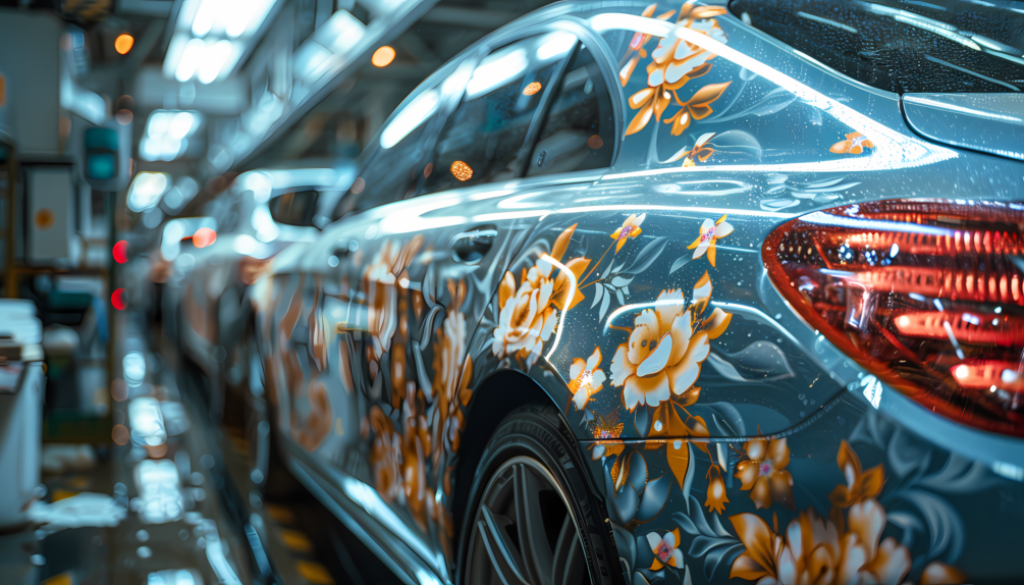Personalized Car Window Decals: Best Vinyl Materials in 2024
Personalized car window decals offer a unique way to showcase your personality, support your favorite sports team, or promote your business. The choice of vinyl material is crucial in ensuring that your decals not only look great but also last long. With advancements in vinyl technology, 2024 promises an array of high-quality options for personalized car window decals.
What are Personalized Car Window Decals?
Personalized car window decals are custom stickers made from vinyl that are designed to be applied to the windows of vehicles. These decals can range from simple text and graphics to intricate designs, allowing car owners to personalize their vehicles. They are commonly used for personal expression, business promotions, and decorative purposes.
Importance of Quality Vinyl Materials
The quality of the vinyl material used in car window decals directly impacts their durability, appearance, and ease of application. High-quality vinyl ensures that the decals withstand various weather conditions, resist fading, and adhere well to the glass surface without peeling or bubbling over time.
Types of Vinyl for Car Window Decals
Cast Vinyl
Cast vinyl is known for its durability and flexibility. It is produced through a casting process that creates a thin, conformable material, making it ideal for curved surfaces and complex designs. This vinyl typically has a longer lifespan, often exceeding five years.
Calendered Vinyl
Another type of vinyl, called calendered vinyl, on the other hand, is made through a calendaring process, which results in a thicker and less flexible material. While it is more affordable than cast vinyl, it is best suited for flat or gently curved surfaces. Calendered vinyl usually has a shorter lifespan, around three to five years.
Specialty Vinyl
Specialty vinyl includes materials with unique finishes and effects, such as reflective, metallic, and glitter vinyl. These types of vinyl are often used to create eye-catching decals that stand out. This vinyl may vary in durability and application ease depending on the specific type.
Top Vinyl Materials for Personalized Decals
3M Vinyl
3M is a leading brand in the vinyl industry, known for its high-quality materials. This vinyl offers excellent durability, conformability, and a variety of finishes, including gloss, matte, and satin. It is a preferred choice for both professional and DIY decal applications.
Oracal Vinyl
Oracal vinyl is another top contender, renowned for its extensive range of colors and finishes. 651 is a popular choice for car window decals due to its outdoor durability and ease of cutting and weeding. This vinyl is also known for its strong adhesive properties, ensuring the decals stay in place.
Avery Dennison Vinyl
Avery Dennison vinyl provides premium quality and performance. Their vinyl materials are designed for long-term outdoor use, offering excellent resistance to UV rays, chemicals, and harsh weather conditions. This vinyl is also easy to work with, making it a favorite among professionals.
Comparing Vinyl Material Properties
Durability
Durability is a key factor when selecting vinyl for car window decals. Cast vinyl generally offers the highest durability, with some products lasting up to ten years. Calendered vinyl, while more affordable, typically has a shorter lifespan, making it suitable for temporary applications.
Flexibility
Flexibility determines how well the vinyl conforms to different surfaces. Cast vinyl excels in flexibility, making it ideal for curved and irregular surfaces. Calendered vinyl is less flexible but works well on flat surfaces.
Adhesive Strength
Adhesive strength ensures that the decal remains securely attached to the window. High-quality vinyl like 3M and Oracal provides strong adhesive properties that withstand various weather conditions and car washes.
Choosing the Right Vinyl for Your Needs
Climate Considerations
When choosing vinyl, consider the climate where the vehicle will primarily be used. In regions with extreme temperatures or high UV exposure, opt for vinyl with superior UV resistance and temperature tolerance, such as 3M or Avery Dennison.
Application Surface
The surface where the decal will be applied also matters. For curved or textured surfaces, cast vinyl is the best choice due to its conformability. On flat surfaces, calendered vinyl can suffice.
Desired Longevity
If you want your decal to last for several years without significant degradation, invest in high-quality cast vinyl. For temporary or seasonal decals, calendered vinyl offers a cost-effective solution.
Application Tips for Personalized Decals
Surface Preparation
Proper surface preparation is crucial for a successful application. Clean the window thoroughly with soap and water, and then use isopropyl alcohol to remove any residue. Ensure the surface is dry and free from dust or grease.
Application Techniques
Use a squeegee or credit card to apply the decal, starting from one edge and working your way across to avoid air bubbles. For larger decals, consider using the hinge method, where you apply one half of the decal first, then the other.
Tools Required
Essential tools for decal application include a squeegee, a cutting tool, masking tape, and a spray bottle with soapy water for the wet application method. These tools help ensure a smooth and bubble-free application.
Maintaining Your Car Window Decals
Cleaning Tips
Regularly clean your decals with mild soap and water. Avoid using harsh chemicals or abrasive materials that could damage the vinyl. Gently wipe the decals with a soft cloth to maintain their appearance.
Avoiding Damage
To prevent damage, avoid scraping the decals with sharp objects or pressure washers. Be mindful of automated car washes, as the brushes can sometimes peel or lift the edges of the decals.
Trends in Personalized Car Window Decals
Popular Designs
In 2024, minimalist and monochromatic designs are trending, offering a sleek and modern look. Personalized text decals, such as names or slogans, continue to be popular. Additionally, decals featuring geometric patterns and nature-inspired themes are on the rise.
Technological Advancements
Advancements in vinyl technology have led to the development of more durable and vibrant materials. Innovations such as smart vinyl, which can change color or display different designs based on temperature or light exposure, are becoming more common.
Conclusion
Personalized car window decals offer an excellent way to add a personal touch to your vehicle. Choosing the right vinyl material is essential for ensuring durability, vibrant colors, and ease of application. In 2024, options like 3M, Oracal, and Avery Dennison provide top-quality choices for any decal project. Whether you’re expressing your style, promoting your business, or decorating for a special occasion, the right vinyl material will make your personalized car window decals stand out and last for years to come.
FAQs
What are the benefits of using personalized car window decals?
Personalized car window decals allow for unique expression, can promote businesses, and add a custom touch to vehicles. They are also relatively easy to apply and remove.
How long do car window decals typically last?
The lifespan of car window decals depends on the type of vinyl used. Cast vinyl can last up to ten years, while calendered vinyl generally lasts three to five years.
Can I remove my car window decals without damaging the glass?
Yes, high-quality vinyl decals can be removed without damaging the glass. Use a heat source, like a hairdryer, to soften the adhesive, then peel the decal off gently.
What is the best way to apply large decals?
For large decals, the hinge method is recommended. Apply one half of the decal first, then the other, using a squeegee to smooth out any bubbles.
Can personalized car window decals withstand car washes?
Yes, high-quality vinyl decals can withstand car washes. However, avoid using high-pressure washers or abrasive brushes that could damage the edges of the decals.
Are there any special considerations for applying decals in cold weather?
Applying decals in cold weather can be challenging. Ensure the surface is warm and dry before application, and consider using a heat gun to help the adhesive bond properly.

